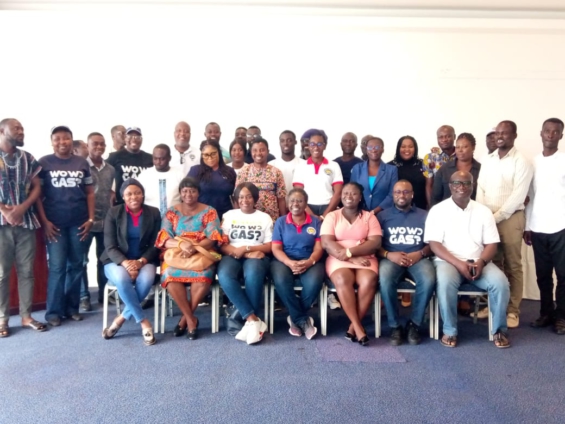The National Petroleum Authority (NPA) Legal Directorate will soon commence the prosecution of criminal acts that occur under the National Petroleum Authority Act 2005 (ACT 691) and its related regulations.
This follows the Attorney's General appointment of a public prosecutor in respect of criminal actions that arise under the Act.
The Head of the Legal Directorate of NPA, Ms Farida Ali-Musah, who made this known during a media engagement in Takoradi, said before the institution of Executive Instrument 378, the police handled in court the majority of the NPA criminal cases.
She said the NPA was established pursuant to the Act with the statutory mandate to regulate, monitor and oversee the petroleum downstream industry.
She said, while the sector continued to grow, the regulatory ambit remained static, with overreaching laws inadequate to significantly keep it abreast with the changing nature of the industry, especially the conduct of some persons in the industry who engaged in criminal activities.
Ms Ali-Musah, therefore, noted that the implementation of Executive Instrument (EI) 378, needed the support and assistance of the Ghana Police Service, Judiciary, Media, stakeholders, and sister agencies to place the NPA in the position to curtail such illegal conduct.
She said EI, 378 would enhance the authority’s regulatory oversight of the industry and stem the tide of criminality that was creeping into the sector and negatively impacting revenue generation opportunities in the country.
She said it would also ensure the successful prosecution of offenders and curtail the brazenness of illegal conduct being perpetrated by persons in the industry.
Ms Ali-Musah mentioned the engagement in activities in the downstream industry without a license, misapplication of prescribed petroleum pricing formula, false statements and withholding of material information, obstruction or interference with officers and employees of the authority, the abuse of the BRV tracking and volume monitoring regulation and the Petroleum Product Marketing regulations among others as offences that would be prosecuted.
The Western Regional Manager of NPA, Mrs Sandra Aidoo, said the region had recorded high figures for confiscation of illegal fuel and ‘tabletop’ fuel operators of petroleum products.
She said between January and April this year, her outfit in collaboration with the Navy and Marine Police confiscated 73,000 litres of crude oil and 108,000 litres of diesel from smugglers along the coastal communities in the region.
Ms Aidoo explained that they initially confiscated 108,000 litres of diesel on the high seas in January of which the smugglers were arrested and were currently standing trial in court, while the 73,000 litres of crude oil were confiscated in April, but the smugglers however bolted and left the crude oil, which has since been sent to Accra for the necessary action to be taken.
She said as part of their monitoring exercise, four retail outlets that did not meet compliance scores were closed and called on the public to avoid patronising fuel sold on "tabletops”, stressing that though they might have cheaper prices NPA could not guarantee the quality of their fuel.
Ms Aidoo said her outfit in collaboration with the Police and other stakeholders would soon embark on a swoop to check on the operations of the "tabletop" fuel operators who she described as a risk to the public.
On his part, the Head of Planning at the Authority, Mr Dominic Aboagye said systems and interventions to ensure unbroken supply of oil which included, the innovative Gold for Oil policy helped to secure the nation's credential as a hub of fuel supply in the sub-region.
He said rigorous monitoring of the Lycan programme, special international oil trading licenses, forex auctions and the gold for oil policy ensured a constant supply of fuel in the country, noting that efforts were also being made to increase the oil refining capacity in the country.
Mr Aboagye said NPA used a Lycan allocation programme to ensure fuel availability, which helped to monitor extensively the distribution and consumption trend which had helped to promote the supply of fuel to countries like Mali, Niger, Togo, and Burkina-Faso.
He explained that the mix of policies and interventions enabled the smooth running of the downstream petroleum sector in the face of growing threats and risks to supply which included, geopolitics and climate action policies as well as the threatening forex liquidity risk.
He said NPA was actively advocating the revival of the Tema Oil Refinery and the construction of the Sentuo Refinery to increase fuel refinery and supply in the country.
Latest Stories
-
Trinity Oil MD Gabriel Kumi elected Board Chairman of Chamber of Oil Marketing Companies
17 minutes -
ORAL campaign key to NDC’s election victory – North America Dema Naa
35 minutes -
US Supreme Court to hear TikTok challenge to potential ban
40 minutes -
Amazon faces US strike threat ahead of Christmas
1 hour -
Jaguar Land Rover electric car whistleblower sacked
1 hour -
US makes third interest rate cut despite inflation risk
1 hour -
Fish processors call for intervention against illegal trawling activities
2 hours -
Ghana will take time to recover – Akorfa Edjeani
2 hours -
Boakye Agyarko urges reforms to revitalise NPP after election defeat
2 hours -
Finance Minister skips mini-budget presentation for third time
2 hours -
‘ORAL’ team to work gratis – Ablakwa
3 hours -
Affirmative Action Coalition condemns lack of gender quotas in Transition, anti-corruption teams
3 hours -
December 7 election was a battle for the ‘soul of Ghana’ against NPP – Fifi Kwetey
3 hours -
Social media buzzing ahead of Black Sherif’s ‘Zaama Disco’ on December 21
3 hours -
Afenyo-Markin still suffering from the massive defeat – Fifi Kwetey
3 hours

